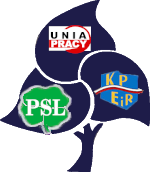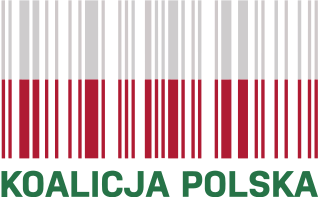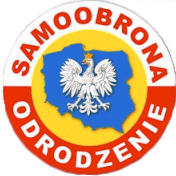The Polish People's Party is an agrarian political party in Poland. It is currently led by Władysław Kosiniak-Kamysz.

From 1989 through 1991, Poland engaged in a democratic transition which put an end to the Polish People's Republic and led to the foundation of a democratic government, known as the Third Polish Republic, following the First and Second Polish Republic. After ten years of democratic consolidation, Poland joined NATO in 1999 and the European Union on 1 May 2004.

Self-Defence of the Republic of Poland is a nationalist, socialist, populist, and agrarian political party and trade union in Poland. The party promotes agrarian socialist and Catholic socialist economic policies combined with a left-wing populist, anti-globalization and anti-neoliberal rhetoric. The party describes itself as left-wing, although it stresses that it belongs to the "patriotic left" and follows Catholic social teaching. The party is sympathetic to Communist Poland, which led political scientists to label the party as neocommunist, post-communist, and far-left.

Parliamentary elections were held in Poland on 25 September 2005. Thirty million voters were eligible to vote for all 460 members of the lower house, the Sejm and all 100 members of the upper house, the Senate.
Renata Lidia Beger is a Polish politician, a prominent member of the populist political party Samoobrona and a member of the Sejm between 2001 and 2007.
League and Self-Defense was a short-lived Polish political alliance between the left-wing populist Self-Defense of the Republic of Poland (Samoobrona) and the national conservative Christian right League of Polish Families (LPR) in July 2007. The alliance was directed against right-wing populist Law and Justice (PiS) that first formed a coalition with both parties, but then gradually marginalized them and shuffled away their ministers. The coalition was marked by mutual distrust as the parties had radically different outlooks, tied together by Euroscepticism, opposition to capitalism and aversion to PiS. The coalition was only polling 6%, and was dissolved by September 2007, shortly before the election. In the 2007 Polish parliamentary election, both LPR and Samoobrona failed to reach the 5% electoral threshold, losing all their 92 Sejm and 10 Senate seats. The downfall of both parties is considered to have been caused by PiS appropiating their political rhetoric.

Parliamentary elections were held in Poland on 21 October 2007, after the Sejm voted for its own dissolution on 7 September. The election took place two years before the maximum tenure of four years, with the previous elections having been in September 2005. The early elections were a result of serious allegations of massive corruption on the part of Andrzej Lepper, leader of the Self-Defense of the Republic of Poland, whose party served as a junior coalition partner to the government of Prime Minister Jarosław Kaczyński. All 460 seats in the Sejm and all 100 seats in the Senate were up for election.

Patriotic Self-Defence was a minor political party in Poland. The party was founded in September 2006 by former members of the Self-Defence of the Republic of Poland, who left the party following an argument with the leader of Self-Defence Andrzej Lepper. The party ran in the 2007 Polish parliamentary election, where it tried to take votes from their former party by using a similar name, logo and political program. Ultimately, the party's electoral lists were only accepted in one electoral district. The party won 0.02% of the nationwide vote. It disbanded in 2013.

The Party of Regions was a left-wing Polish non-parliamentary political party created in November 2007 and registered in February 2008. The Party of Regions was created by former members of Self-Defence and the Democratic Left Alliance after the parliamentary election in 2007, when Self-Defence support collapsed to far less than the 5% electoral threshold giving them no seats in the new legislature. Founders of the grouping included Krzysztof Filipek, Danuta Hojarska and Bolesław Borysiuk. For failure to disclose their financial records for the year 2015, they were struck off in early 2017.

The Social Alliance was an electoral coalition created for the 1998 Polish local elections. Formed on 27 June 1998, the Social Alliance included the Polish People's Party along with its smaller left-oriented party partners, such as the Labour Union, the National Party of Retirees and Pensioners, the Self-Defence of the Republic of Poland and few members of Alliance of Democrats (Poland). The party represented the "independent left" that challenged the anti-communist and pro-communist dichotomy of Polish politics while maintaining a strongly leftist profile inspired by pre-WW2 socialist and agrarian movements. It protested against the capitalist reforms carried out in Poland such as austerity, criticizing them for creating massive wealth inequality. Nevertheless, the coalition cooperated with the post-communist Democratic Left Alliance as well as the Polish Socialist Party.

The 2014 European Parliament election in Poland elected the delegation from Poland to the European Parliament. It took place on 25 May 2014. The Polish electorate will elect 51 MEPs, compared to 50 in the 2009 election.. The number of MEPs is a result of the 2013 reapportionment of seats in the European Parliament. This means that Poland will have 6% of the total seats in the European Parliament.

The Polish Coalition is a political alliance in Poland. It is led by the Polish People's Party.

The AGROunion is a left-wing agrarian socialist political movement in Poland formed by Michał Kołodziejczak. AGROunia criticizes the actions of current politicians in relation to the state of agriculture in Poland and organizes agricultural protests and information campaigns. The party declares to be built on agrarian socialist ideals and to have taken inspiration from the left-wing nationalist Samoobrona movement, Fighting Solidarity, as well as pre-war agrarian movements such as Polish People's Party "Wyzwolenie". Officially registered in 2022, the party became a socialist party with agrarian and Catholic overtones, with the leader of the party stating in 2022 that "faith, tradition, and Saint Mary herself are all elements of socialism for me". The party denies the labels of populism and nationalism.

Self-Defence Rebirth is a Polish political party founded by the former Self-Defence of the Republic of Poland activists. The party was founded by the former lawyer of Andrzej Lepper, Henryk Dzido, who split off from the main Self-Defence party following numerous scandals and the electoral collapse of Samoobrona. Self-Defence Rebirth was also created over concerns that Samoobrona might form a coalition with the right-wing League of Polish Families. Zbigniew Witaszek is one of the key activists of the new party. The party describes itself as Catholic socialist, agrarian socialist, Soft Eurosceptic and left-wing.

Peasants' Party is a Polish political party founded by the former Self-Defence of the Republic of Poland activists in 2018. The party was registered in April 2018 by Krzysztof Filipek, a long-time vice-chairman of Samoobrona, who seceded from Samoobrona for the regionalist Party of Regions in 2007 before founding the Peasants' Party. The party includes former MPs and agrarian activists of Self-Defence such as Danuta Hojarska and Renata Beger. The party announced that it would not run independently in elections, and started cooperating with agrarian trade unions and sought coalitions with left-wing parties. In August 2018, the party entered an agreement with the left-wing Democratic Left Alliance to run on the party's electoral list.

United Beyond Boundaries, known as Action of Disappointed Retirees and Pensioners until 2022 is a Polish political party founded in 2018. The party was created in February 2018 and formally registered six months later, in August 2018. The leader of the party is Wojciech Kornowski, a prominent member and founder of the nationalist communist organisation Patriotic Union "Grunwald". Kornowski was briefly the leader of democratic socialist National Party of Retirees and Pensioners in May 2012, but seceded from the party to create his own pensioner-oriented party Pensioners' Party of the Republic of Poland, which then became the Action of Disappointed Retirees and Pensioners in 2018. Since 2022, the party also leads an electoral committee "United Beyond Divisions".

Self-Defence Social Movement was a political faction within Self-Defence of the Republic of Poland and later an independent political party. Social Movement emerged as a political faction within SRP in early 2000s amongst the local activists of the party in Mazowsze. The faction placed particular emphasis on agrarianism and rural interests. It also fought for social justice and defended people against evictions. In 2006, Social Movement entered into conflict with party leader Andrzej Lepper over the party's electoral lists for the 2006 Polish local elections, which included many newcomers and non-members at expense of long-serving members of the party. The conflict came to a head when the leader of the faction Sławomir Izdebski demanded expulsions of Krzysztof Filipek from the party.

Self-Defence of the Polish Nation, later Defence of the Polish Nation was a minor political party in Poland. The party registered on 15 July 2005 and was a split of 70 members from the left-wing agrarian socialist Self-Defence of the Republic of Poland, though the party already existed as a dissident faction faction within the party since 2003. The party tried to participate in the 2006 Polish local elections and act as a spoiler party against Samoobrona, but the Polish court struck the party off the ballot because of its name and logo being too similar to SRP. In response, the party changed its name to "Defence of the Polish Nation" in October 2006.
Polish Reason of State was a minor Polish political party that was active between 2003 and 2005, with a parliamentary circle in the 4th Sejm that functioned between 2003 and 2004. Founded in September 2003 by former members of the Self-Defence of the Republic of Poland, the party was registered in late 2004 and was composed of four Samoobrona MPs that were expelled from the party on 23 July 2003. It was later joined by two former Samoobrona members that left the party prior to 2003.

The Fatherland – Polish List was an electoral alliance in Poland created by the National Party "Fatherland". It was an electoral bloc that the National Party contested the 1993 Polish parliamentary election with. It unsuccessfully sought an alliance with a far-left agrarian socialist Self-Defence of the Republic of Poland.
















